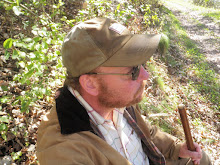
It happens to us all sooner or later; the dreaded 'skunk' or 'black dog'.
I have been skunked more times than I care to remember. Sometimes whole trips went fishless.
You get on the water with confidence and excitement, and as the day wears on without anything to show for it, you begin to get reflective and think "What the heck?". This is actually a good process to go through. Sometimes we are such creatures of habit that a little kick in the pants can be beneficial. We fish the same runs the same way over and over, because what worked before has just got to work now, right? Perhaps not. In that self examination we might start casting and working the water more slowly. We might start thinking again instead of acting on reflex. We may notice something we missed. I have fished a local stretch of water for years pursuing smallmouth, and usually do quite well. One day earlier this year I started only catching little 10" fish. After an hour of this, I stopped near the tail of the run where I always have cast to the East bank, and turned around with my popper to cast to the rocky flats of the west bank. On the first cast my popper was savaged by a 17" bass. If I had kept doing what I always did, I never would have discovered where the big boys were that day.
Thinking, reflecting, studying, and experimenting can all a result of sub-par fishing results, but sometimes things can get psychological. This is the true skunk in all it's glory. You may have been in an optimistic mood, fishing along and whistling a pleasant tune, when slowly the skunk takes over your mind, and things go dark. It can sneak up on you. You begin to cuss, swear, and change flies every cast. You are not thinking with logic now, just desperation. The best thing to do here is to sit down on the bank, close your eyes, and go to a happy place for a few minutes. If you don't, then your whole day may be in danger.
The worst part of Mr. Skunk is that he likes to wait until you are fishing with a partner and then attach himself to your back. Your buddy hits fish after fish, and finally feeling sorry for you, trades pools or runs with you, telling you "That pool is loaded with fish". He or she shows you what fly is hot, and then you go to it. You do the exact same thing he did, but can't buy a fish if your life depended on it. At this point a good fishing partner will just walk away and leave you to your misery. Misery may love company, but not an audience. Take heart friend, I have been there.
One time early in my flyfishing days, I was using Dahlberg divers to ply the river for bass. Three days before I had landed a 19" fish and two 15 inchers, as well as the smaller guys. That day I touched nothing all evening, until as I was literally on the bank walking out of the river at the take-out, a little bass hit my fly as I was tying my boot lace, jumped in the air, and spit the diver onto the bank at my feet as if to say "Just go home already you idiot".
Thinking back on that day, the whole experience was my fault. I did the same thing I always did, didn't adapt to conditions, and then let Mr. Skunk get into my head.
Mr. Skunk has something to teach us all... if we can survive the experience with our sanity intact...
Anglers have come up with all kinds of remedies for the dreaded skunk. They pour whiskey on the water, swing dead chickens over their head, promise not to bathe or shave until they catch a fish, use the lucky fly kept in their hat, and even make up prayers to the river gods. One popular method of banishing the skunk is to hold a true camp wilding. Copious amounts of booze is consumed, stories told, lies embellished, arguments started, and bonds established around the campfire while setting fire to all the marshmallows, falling on your tent, and wearing your underwear on your head. For some reason this often works. The next day you are no good shape to do anything, can't cast, and are all twitchy, but somehow can't keep the fish off your flies.
Getting skunked is one of the greatest impediments to new anglers picking up fly fishing. Going a whole day with only two or three fish to show for it takes a lot of patience, endurance, or insanity. Most likely the latter. I don't think the average fisherman has that patience. Many seem to want to walk down to the river, make one or two casts, and catch the trophy of a lifetime.
Putting in time on the water is what defines an avid angler. Getting skunked is a necessary part of that experience.
The Dechutes river in Oregon is my nemesis. It is supposed to be a fairly easy river to catch fish in, but in over twenty days on the river I have only landed one steelhead. I fished good runs, read the water, but always had bad luck. I always seemed to hook fish by accident within a foot or three of the bank on the dangle, feel a tug or two, and then be left with a feeling of profound loss. My fishing partner used to say "Well, where do you want to get skunked today"?
One thing above all will guarantee that Mr. Skunk makes an appearance. Over-confidence or overt braggadocio. Walking down to the river stating "We are going to pound them today" is likely to put every fish in the river in a sulk.

















